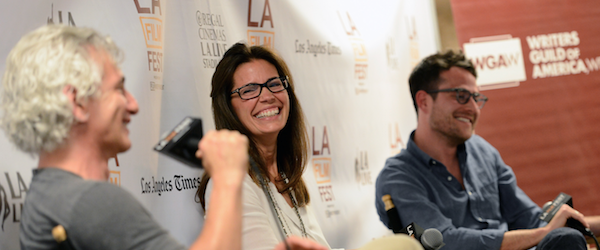How Successful Screenwriters Cope with Notes

Notes.
They’re the bane of every screenwriter’s existence—whether they come from friends, other scribes or executives.
And nothing could be further from the truth.
“Writers can be defensive and that screws yourself in so many ways,” said Ed Solomon, writer of Bill &Ted’s Excellent Adventure and Now You See Me. “Get your ego out of the way and accept the fact that despite what you wanted your script to be, it’s not appearing that way to others.”
That doesn’t mean their opinion is necessarily right though, Solomon said during the Screenwriter’s Coffee Talk at the 2014 Los Angeles Film Festival. Erin Brockovich and Pocahontas writer Susannah Grant added it’s the writer’s job to take the note and understand it. She said it’s critical to communicate with the note giver and tell them “I’m not understanding you. Walk me through this.”
The key, Grant said, is to view producers and executives as partners and not adversaries. “I take it for granted that people giving the note want the movie to be good,” Solomon said. “You’re in a room with people who most of whom are smart. One of the misconceptions is that it’s a room full of idiots and that’s never the case.”
Grant said she never leaves the meeting without totally understanding the note whether she agrees with it or not. “Have that conversation and often the note is ID-ing a problem. I have them open the script and show me where they first started feeling this,” she said.
While in the meeting, Solomon said to never disagree with the note as it’s professionally stupid and creates an embarrassing experience for person giving the note. “You need to hear the problem,” he said. “Open up, keep the discussion going and keep engaging.”
Max Borenstein, writer of Godzilla (2014), said often what appears to be a bad note really points out something the writer is resisting due to feeling the script is finished. “You’re never done,” Borenstein said. “You might want to take the path of least resistance and that’s the most dangerous. Ignoring it might be the real problem.”
When Solomon disagrees with a note, he takes time to reconsider it. “I often find that the difficult thing is not to take it literally about what they are suggesting. Maybe it’s just the wrong way to go about it. My job as the writer is to find the right way.”
Glen Golightly / Festival Blogger